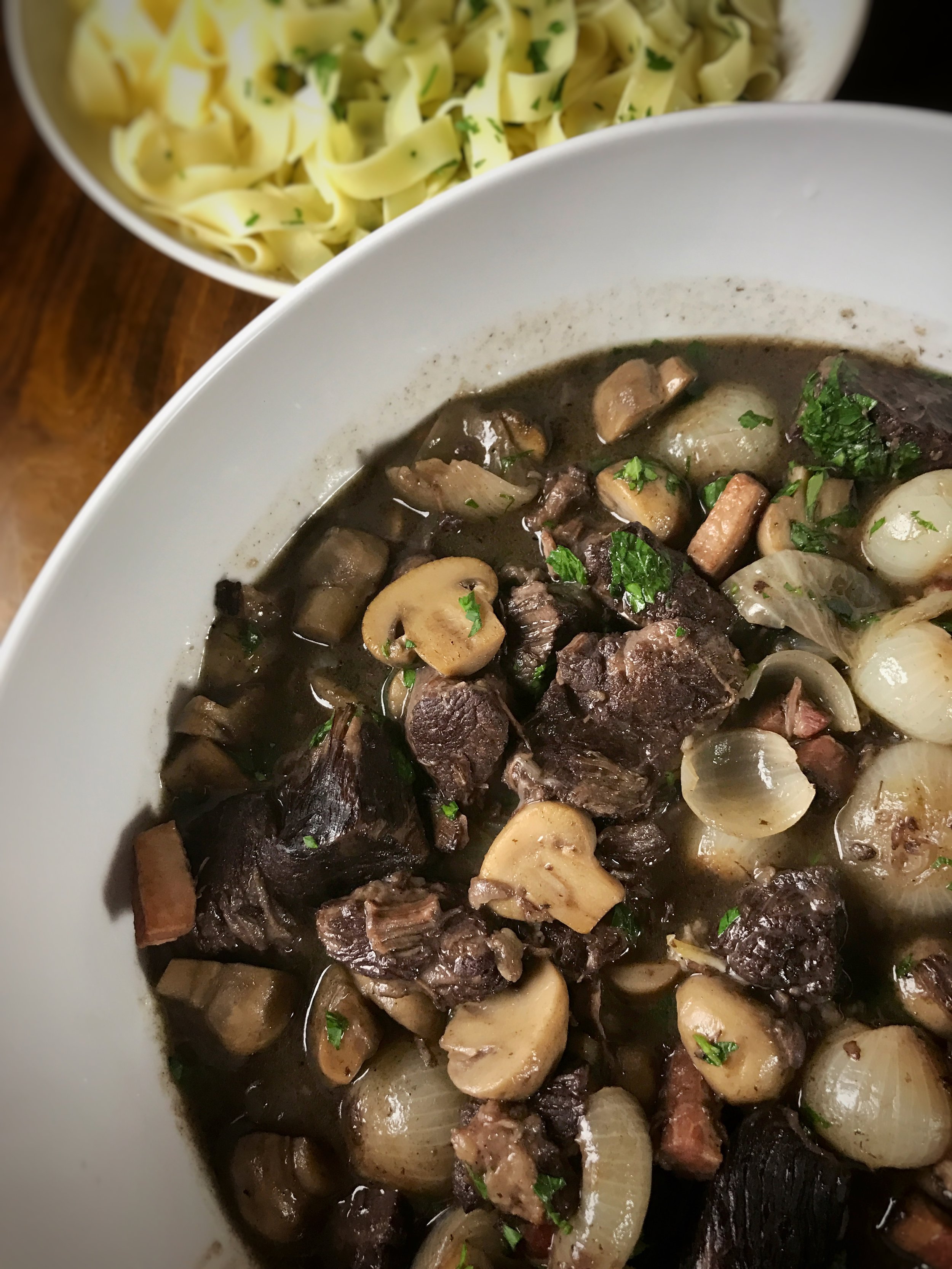For as long as I've been a cook, I've been making boeuf bourguignon – the classic French wine-braised beef stew with mushrooms, lardons and baby onions. There's something so deeply soulful about the dish, which simmers for a couple of hours in the oven, filling the kitchen with an incredible aroma.
Those transporting scents always deliver on their promise: Beef bourguignon, a dish that coaxes maximum deliciousness from humble ingredients, is a dreamy dish to serve to friends – with good red wine and a loaf of crusty French bread for soaking up the fabulous, richly flavored sauce. It's impressive enough for any important celebration – such as New Year's Eve – or no occasion at all. Maybe it's just what you want to eat on a cold winter evening with a fire going in the fireplace. It's a dish that never shows off, but always thrills. And while it may look like a lot of steps, it's no more complicated or time-consuming than making chili.
And because you can completely make it ahead – even the day before – it's the ideal (stress-free!) dish to serve at a dinner party, along with boiled or roasted potatoes or buttered noodles. Precede it with a wintry salad, céleri rémoulade, or, as I did this Christmas Eve, a super easy-to-make yet luxurious and velvety roasted cauliflower soup swirled with brown butter.
I must have originally learned to make beef bourguignon from Julia Child's Mastering the Art of French Cooking, but over the years, I've played with the recipe, trying to answer the questions that inevitably nip at a cook's heels: What's the best cut of beef to use? What kind of wine? Should you marinate the beef or not?
After so many years, and so many versions – abetted by a recent round of reading and more playing – I think I finally have my be-all-and-end-all version.
Let's start with the red wine. You use a whole bottle, so you'd better use something really good, right? Well, no – happily, it doesn't much matter what you use, as long as it hasn't turned to vinegar. I never spend more than $8 or $9 dollars on the wine for this dish.
For the beef cuts, I had to abandon my beloved Julia, who calls for "lean stewing beef." Mais, non! – what you want is a fattier cut, like beef chuck, which will become super-tender as its collagens break down through its long braise. Lean stewing beef becomes hard and tough.
From Anne Willan, author of many wonderful cookbooks and head of La Varenne cooking school in Burgundy, I gleaned the idea of using a combination of chuck and beef shank. In her fine recipe in The Country Cooking of France, Willan calls for boneless beef shank. Why not keep the bone to cook in the stew, I thought, as it (arguably) adds body and flavor? Better than throwing it away, right? I was glad I did.
I read with great interest Serious Eats' thorough story on how to make a great beef bourguignon, and pulled from it other great ideas. Author Daniel Gritzer writes about extensively testing using a marinade versus not, concluding that there's no point in marinating a long-braised dish such as this. I will gleefully accept his assays, as I've never noticed a difference in marinated verses non-marinated versions, and it's a pain to dry off the meat before browning it.
And here's something even more interesting Gritzer concludes: Browning bite-size cubes of beef dries out their surface too much. That's definitely something I've noticed over the years. His solution is to cut the meat into big slabs, and brown just two sides of the slabs, then cut up the meat. I took a different (and simplified) approach, cutting the meat into large-ish chunks (around an inch and a half is ideal), and browning just one side of the cube well, then a quick sear on another side and that's it. It's much less time-consuming (and boring) than thoroughly browning the cubes, as I used to do, and it resulted in a texture that was definitely softer and more appealing, while still getting some of the wonderful, flavor-enhancing caramelization of browning. It's a lazy man's solution that pays off!
Yes, I know; this is a lot of bla bla bla. But it's all in the service of trying and testing and experimenting so that you (and I!) get the best possible result with the least possible effort.
Ready to cook?
Here's the way it'll go, in a nutshell. Brown the meat, then lightly cook your aromatic vegetables – onion, celery and carrot – which you don't even have to dice (just cut 'em in a few pieces – another labor-saving idea I got from Serious Eats), and a little garlic. Deglaze the pan with a little wine, then add back the meat, the shank bone, the rest of the bottle of wine, a little chicken broth and a bouquet garni, bring to a simmer, then shove it in a slow oven for almost two hours, nearly unattended (just just want to stir it once or twice). Skim off the fat, discard the aromatic vegetables and bone, strain the sauce and add the meat back in, then add the garnishes you've prepared: lardons, mushrooms and baby onions, and braise another half hour.
It's more time than work, and the payoff is nothing short of awesome.




